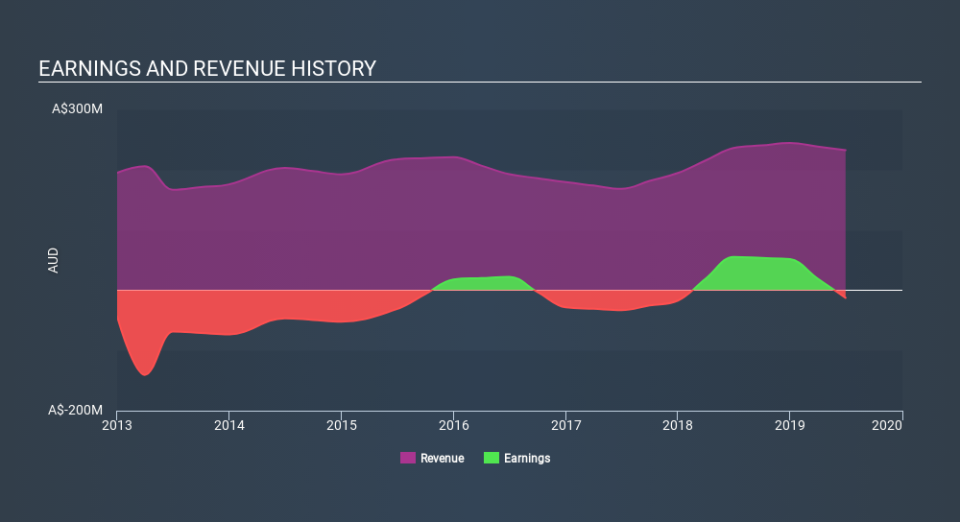Imagine Owning Aeris Resources (ASX:AIS) And Trying To Stomach The 76% Share Price Drop

It's not a secret that every investor will make bad investments, from time to time. But serious investors should think long and hard about avoiding extreme losses. So we hope that those who held Aeris Resources Limited (ASX:AIS) during the last year don't lose the lesson, in addition to the 76% hit to the value of their shares. That'd be enough to make even the strongest stomachs churn. Longer term shareholders haven't suffered as badly, since the stock is down a comparatively less painful 13% in three years. Furthermore, it's down 29% in about a quarter. That's not much fun for holders.
See our latest analysis for Aeris Resources
Aeris Resources isn't a profitable company, so it is unlikely we'll see a strong correlation between its share price and its earnings per share (EPS). Arguably revenue is our next best option. When a company doesn't make profits, we'd generally expect to see good revenue growth. Some companies are willing to postpone profitability to grow revenue faster, but in that case one does expect good top-line growth.
Aeris Resources's revenue didn't grow at all in the last year. In fact, it fell 1.6%. That's not what investors generally want to see. The market obviously agrees, since the share price tanked 76%. That's a stern reminder that profitless companies need to grow the top line, at the very least. But markets do over-react, so there opportunity for investors who are willing to take the time to dig deeper and understand the business.
The company's revenue and earnings (over time) are depicted in the image below (click to see the exact numbers).
You can see how its balance sheet has strengthened (or weakened) over time in this free interactive graphic.
What about the Total Shareholder Return (TSR)?
We've already covered Aeris Resources's share price action, but we should also mention its total shareholder return (TSR). The TSR attempts to capture the value of dividends (as if they were reinvested) as well as any spin-offs or discounted capital raisings offered to shareholders. Aeris Resources's TSR of was a loss of 76% for the year. That wasn't as bad as its share price return, because it has paid dividends.
A Different Perspective
Investors in Aeris Resources had a tough year, with a total loss of 76%, against a market gain of about 24%. Even the share prices of good stocks drop sometimes, but we want to see improvements in the fundamental metrics of a business, before getting too interested. Regrettably, last year's performance caps off a bad run, with the shareholders facing a total loss of 0.2% per year over five years. We realise that Buffett has said investors should 'buy when there is blood on the streets', but we caution that investors should first be sure they are buying a high quality businesses. You might want to assess this data-rich visualization of its earnings, revenue and cash flow.
If you would prefer to check out another company -- one with potentially superior financials -- then do not miss this free list of companies that have proven they can grow earnings.
Please note, the market returns quoted in this article reflect the market weighted average returns of stocks that currently trade on AU exchanges.
If you spot an error that warrants correction, please contact the editor at editorial-team@simplywallst.com. This article by Simply Wall St is general in nature. It does not constitute a recommendation to buy or sell any stock, and does not take account of your objectives, or your financial situation. Simply Wall St has no position in the stocks mentioned.
We aim to bring you long-term focused research analysis driven by fundamental data. Note that our analysis may not factor in the latest price-sensitive company announcements or qualitative material. Thank you for reading.

 Yahoo Finance
Yahoo Finance 
